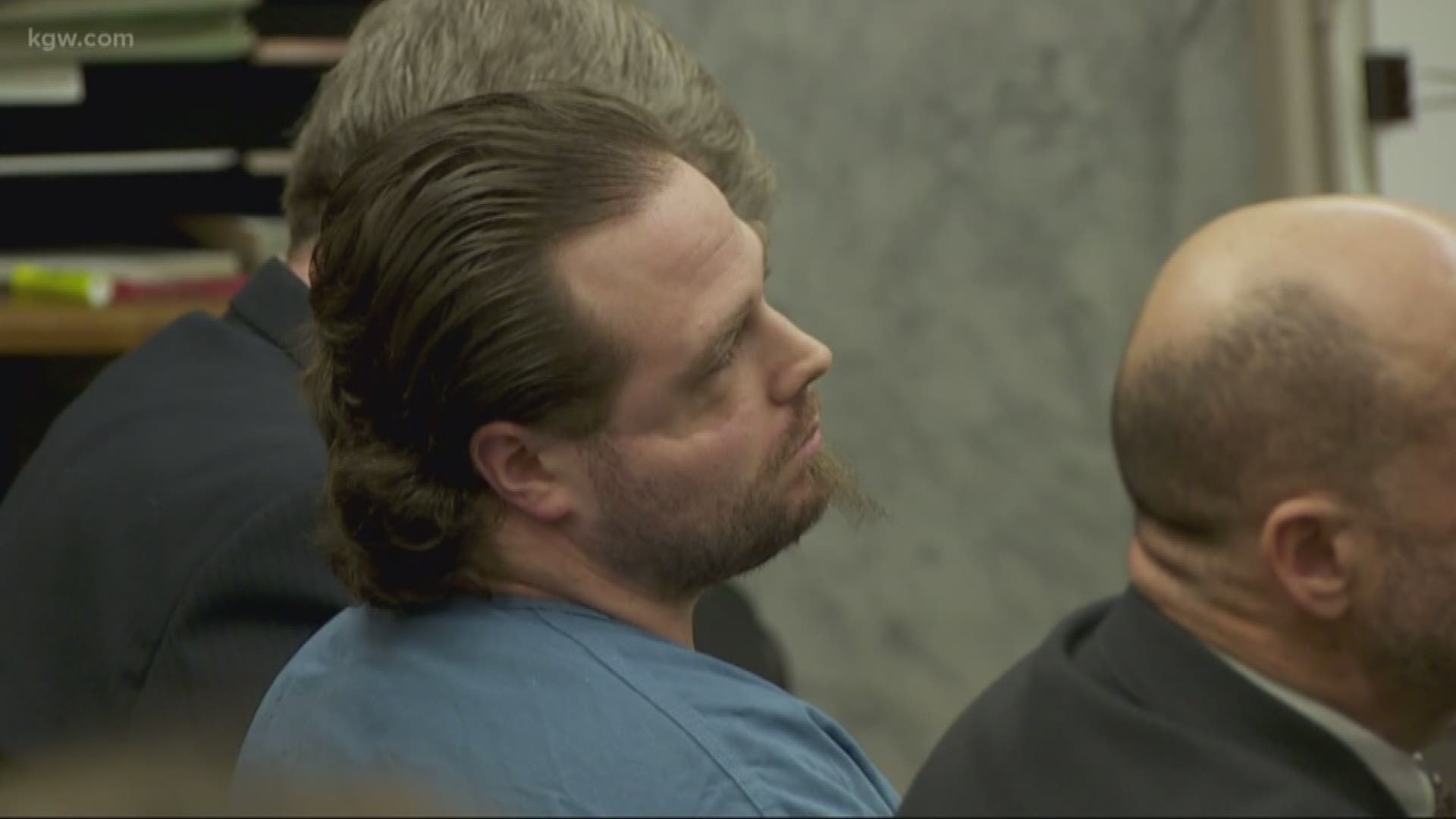PORTLAND, Ore. — UPDATE: The jury found Jeremy Christian guilty on all counts. More here
Jury deliberations are underway Thursday in the murder trial of Jeremy Christian, who is facing 12 charges related to the MAX stabbings on May 26, 2017.
Christian is accused of going on a hateful rant aimed at two black teen girls aboard that TriMet MAX train. An altercation followed between Christian and two other men, Micah Fletcher and Taliesin Namkai-Meche, and quickly escalated.
Prosecutors say Christian took a 4-inch knife from the pocket of his shorts and stabbed Fletcher, Namkai-Meche and another passenger, Ricky Best within just 11 seconds. Best and Namkai-Meche died. Fletcher was gravely wounded, but survived. The knife barely missed a main artery that would have killed him.
The trial began Jan. 28 in Multnomah County court, and included emotional testimony from Fletcher, the two black girls who felt like they were targeted by Christian's rant, psychologists and psychiatrists, and several people who knew Christian while he was growing up.
His lawyers are using the "guilty except for insanity" (GEI) defense, and built up their case in the past few weeks by showing Christian is on the autism spectrum, has personality disorder and was in a "state of dysregulation" during the stabbing.
They have also suggested Namkai-Meche and Fletcher were the aggressors, which resulted in Christian using his knife to defend himself.
In turn, prosecutors have said the stabbing clearly wasn't spur-of-the-moment, as they showed videos of Christian the night before the stabbing, referencing wanting to stab and kill people. A Portland police detective who interviewed Christian testified he was aware of what he did shortly after the stabbing.
Multnomah County First Assistant to the District Attorney Jeff Howes presented the state's closing argument Wednesday morning.
He said the defense's argument that Christian was using self-defense that day because he felt threatened by Fletcher and Namkai-Meche doesn't hold up.
According to Oregon law, you are justified to use physical force against another person if you think that individual is "committing or attempting to commit a felony" by using physical force against you.
That physical force that you respond with would have to be what an individual "reasonably believes" is necessary.
"A reasonable person wouldn’t have killed two people instantly," Howes said. "There's no rationalization to lead someone to believe [what Christian did] is an appropriate response."
Howes further argued Christian was the provocateur in that incident, being the first person to use physical force by pushing Fletcher and Namkai-Meche and telling them to, "Do something! Do something, b****!"
Days before the stabbing, Howes said Christian's mother told him it was time for him to move his belongings out of her house. At that point, Howes said Christian Google searched the Oregon Department of Corrections.
When it comes to Christian's mental health, Howes said the defense's experts were flawed in diagnosing Christian with autism spectrum disorder, and that Christian was of sound mind before, during and after the stabbing.
"Dr. Derning went looking for autism," Howes said.
Christian's attorney Greg Scholl delivered the defense's closing argument Wednesday, saying Christian felt like he was being cornered by three men before the stabbing, and put much of the blame of what occurred on the train on Micah Fletcher.
"Micah admitted it didn't go well and he wasn't thinking of his own personal safety," Scholl said. "He was asked if he would do it the same way again and he said yes. That's troubling at the very least and extremely outrageous."
Closing arguments and the prosecution's rebuttal wrapped around 4 p.m. Wednesday.
Christian was offered the chance to testify at his own trial, but he declined to do so.
Before the jury went into deliberation, Judge Cheryl Albrecht read them a 20-page packet of instructions, explaining each charge.
Christian is facing two counts of first-degree murder, three counts of intimidation, two counts of unlawful use of a weapon, two counts of menacing, and one count each of: attempted murder, assault in the first degree and assault in the second degree.
On Friday morning, court was called into session briefly so that Judge Albrecht could clarify for the jury the definition of the term "threat to inflict serious physical injury" in regards to the intimidation charges.
The defense had argued that Christian's rant ahead of the stabbings, though horrifying, included no direct threats and was, therefore, protected under the First Amendment.
For the murder charges, all 12 jurors need to find Christian guilty to return a guilty verdict. Ten or more jurors must agree he's not guilty to return a not guilty verdict.
For all other charges, 10 or more jurors need to agree on the verdict.
When it comes to how long she thinks the jury will deliberate, former Multnomah County District Attorney Stacey Heyworth said she's unsure, but she doesn't think it'll take nearly as long as a lot of murder trials.
"I say that because they had the opportunity to see him, they had the opportunity to hear him. And so even as much as the prosecution is going to point all that information out and make them remember it over and over again in their closing, it's already seared, I think, in the minds of those jurors," Heyworth said.

